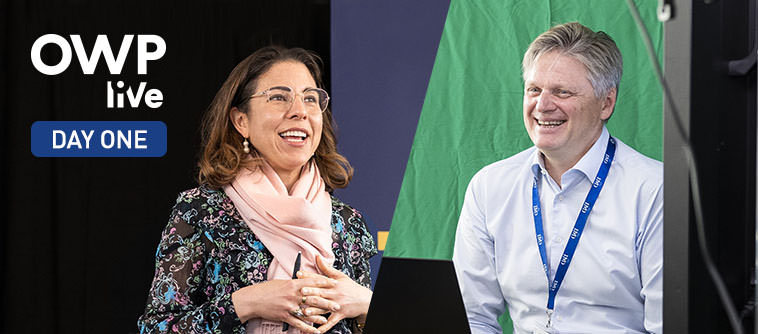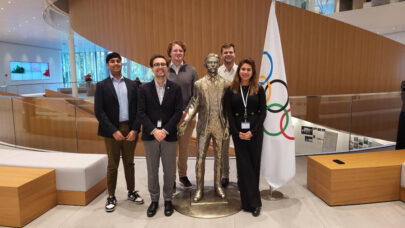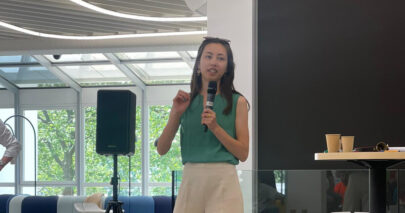The opening of the second OWP liVe virtual program revealed the tricks of effective negotiation techniques, how to debias your decision making with technology, and why sustainability and agility are proving increasingly vital in turbulent times.
‘Enter a negotiation with a smile on your face and a gun in your pocket’
Sameh Abadir, Professor of Leadership and Negotiation, outlined five strategies for a successful business negotiation — including managing your own stress and developing cross-cultural competencies to get high-stakes deals done in a globalized world.
Abadir said that business negotiations are becoming far harder because of globalization, forcing greater cultural awareness. Another challenge is the shortening of the product life cycle because of the growth in popularity of China as a low-cost manufacturing hub. That means brands are changing their products and services far more quickly, and therefore the terms of deals with suppliers and customers are in a near-constant state of flux.
“More and more, the negotiations we face are tougher, and must include an understanding of different cultures, dealing with bad news and dealing with stress,” he said. “These are the key factors to win a successful business negotiation.”
The other keys to securing a good deal include being cooperative or keeping in mind the other side’s underlying interests to avoid deadlock.
And if a good deal cannot be struck, Abadir advised that it’s better to walk away from the negotiating table with dignity, leaving open the possibility of future talks.
Sustainability will help make your company more resilient
Businesses must become sustainability champions and play their part in the climate solution in order to remain competitive as well as attractive to employees and investors, said Professor Knut Haanaes who is the Lundin Sustainability Chair at IMD.
Investors are increasingly considering the environmental, social and governance (ESG) stance of companies in their financial decisions, he said.
During his session “Create a corporate sustainability strategy for resilience and renewal”, Professor Haanaes examined the evolution of sustainability-oriented strategies with a focus on the governance and the accountability of companies.
Sustainability is a mega trend and has become a necessary approach for creating long-term value, often requiring a profound rethinking of current business models, he explained.
Driving attention to the effectiveness of sustainable business models also orients and engages future generations to contribute to the sustainability of a company and the planet, he said.
Professor Haanaes used values-based ethical leadership as the interpretive key for a case study of the global firm Grundfos.
Moncef Tanfour, Group VP Strategic Development, and Janda Campos, Head of Sustainability Engagement, assessed Grundfos’ resilience, derived from its sustainable business model. From a strategic and operational perspective, the world’s largest pump manufacturer has aligned its approach with SDGs to transform itself into a customer oriented solutions provider.
The age of disruption demands agile leaders
The challenges of being both an accelerator and a perfectionist, and of sharing power while ensuring accountability, were among the questions raised with Jennifer Jordan, Professor of Leadership and Organizational Behavior, during her presentation on how to be an agile leader in a time of disruption.
Why must leaders aim for agility?
The world is moving fast. Disruptors can come from anywhere; product life cycles are changing; customer bases are changing. If organizations don’t adjust quickly, they won’t survive.
What does an agile leader bring to this arena?
In times of disruption, leaders need a clear and inspired vision for the future. Develop a detailed plan for the very immediate future – the next month or two – which will tell you how to get there in the short term. Plans will adapt to changing terrain, so agility is a must.
Are the days of ‘command and control’ leadership over?
Traditional leadership behaviors remain valuable, but digital leadership competencies must be added. Moving between those modalities with agility has become a key skill.
How is agility best deployed?
We must all develop situational awareness. The ability to assess whether events demand traditional or new world competencies will enable you to bring the most relevant leadership tactics to the fore.
How can one apply agility to industry disruption?
Become hyper aware: identify what other players are doing in your industry and what the disruptors and threats are. COVID has provided the best example of how businesses have had to accelerate to meet disruption while also ensuring they were perfectionist on staff safety and security.
Using AI to de-bias decision making
Executive decision making can be hampered by a range of conscious and unconscious biases, but technology can sometimes help, according to Arnaud Chevallier, Professor of Strategy, Amit Joshi, Professor of AI, Analytics and Marketing Strategy, and Maude Lavanchy, Research Fellow.
In their session, “Debiasing your decision making with AI”, the trio used interactive quizzes to demonstrate how biases and noise often confound executive decision-making. Bias is a systematic error in decision-making that may be inherent in human beings or learned over the years. Noise, on the other hand, constitutes random errors caused by interaction with the environment.
The session highlighted that while AI and machine learning may be useful in tackling noise in many situations, handling bias is much harder. Broadly, in cases where rapid feedback is available, machine learning systems can provide a significant advantage.
In contrast, where feedback is either slow or lacking, it may be better to depend on simply analytic systems, or even good old-fashioned human decision-making.
Thus, noisy decisions are fixable. Biased decisions are much harder to fix.



